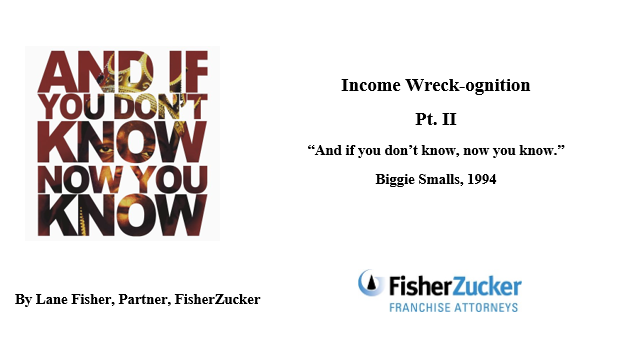Income Wreck-ognition-Part-II
Did you miss Part I? Check it out here.

Given the robust activity around my recent post on Income Wreck-ognition, I think I have your attention. As a refresher, the upcoming changes in auditing practices require a franchisor to amortize the initial franchise fee over the term of the franchise agreement – unless it relates to any “distinct” performance obligations. The effect could be to reduce your income recognition by as much as 90%, and create a liability on the balance sheet for the unearned portion. So, the task at issue to mitigate the effect of your audited financials is convincing your auditors that some services you provide for the initial franchise fee are “distinct” from the trademark license provided in the Franchise Agreement.
This erosion in capital will drive many franchisors, particularly emerging franchisors, into a negative net worth. This change could negatively affect franchise sales and openings, impede state registration, impair the availability of real estate and put franchisors in violation of loan covenants. Given the frenzy among private equity firms around franchising, these changes will likely mar valuations of existing portfolio companies and curtail acquisitions while these owners reconcile old valuation models with current financial statements.
Some large auditing firms have determined that, as a matter of audit policy, they will require 100% of the initial fee to be amortized. Most auditing firms will work with the franchisor to determine what portion of its initial franchise fee relates to obligations which arise independent of the trademark license, and is therefore able to be recognized upon completing specific pre-opening performance obligations – at least, that is supposed to occur.
While auditors will make each analysis on a case-by-case basis, some portion of the fee which relates to training, site selection and other valuable products and services to franchisees at or before opening may be recognized upon opening, as has been the case historically. Under the new guidance, the franchisor determines if the pre-opening activities contain any distinct goods or services, besides access to the franchisor’s intellectual property.
A fee for a service in the initial fee is distinct if both (i) the franchisee can benefit from the good or service either on its own or together with other resources readily available (that is, the good or service can be distinct), AND (ii) the franchisor’s promise to perform the service for the franchisee is separately identifiable from other promises in the contract (that is, the promise to transfer the good or service is distinct within the context of the contract).
In other words, are there specific identifiable obligations that have value outside of the franchise relationship? The example most commonly used is the portion of the initial fee associated with QuickBooks training, which has independent value apart from operating the franchise.
The franchisor must allocate the fair market value of the distinct good or services – e.g., the QuickBooks training – from the initial fee to determine the amount recognized upon completing the training. The challenge for franchisors on this issue is the inherent interdependence or high interrelation between the franchisor’s pre-opening deliverables and the franchise right itself. Further, it is the auditor, not the franchisor, who is the ultimate decision maker on when initial franchise fee revenue can be recognized under the new FASB standards, regardless of the franchisor’s classification or assessment.
Whether other training fees collected as part of an initial fee are recognized upon opening is a function of the nature of the training and whether (i) it is highly interrelated with the trademark license, (ii) it is brand specific and (iii) it could be relevant to the operations of a similar business, or businesses in general. Similarly, site selection services which are distinct from the trademark license because they are not specific to the brand and could be provided by a third party may also be recognized if the franchisor can demonstrate standalone fair market value.
Franchise arrangements vary considerably. Whether pre-opening services are distinct will depend on “what” the franchisor is doing – the nature of the services the franchisor is performing, the value of those services on the open market, and whether those services are distinct – in order to come to an appropriate accounting conclusion.
We have seen international franchisors, already subject to a similar accounting rule, break down the initial franchise fee into components to potentially maximize recognition. Remember, however, that just because a fee is broken out separately with the supporting contractual language, it will not necessarily be considered “distinct” and therefore recognizable upfront. A franchisor isn’t prohibited from arguing that certain distinct performance obligations have value whether or not they are broken out in Item 5. Likewise, one should also closely review the descriptions provided in Item 11 of the FDD to describe the training in ways that will maximize your income recognition.
Franchisors who have the proper substantiation and ability to articulate a credible position as to the value of distinct pre-opening services and deliverables will be better poised to make the case for upfront recognition.
While your accountant has the final say, you may want an experienced advocate in your corner. Our representation of more than 250 franchise brands gives us the institutional knowledge about how other brands have obtained better treatment. Put us to work for your brand.
Back



